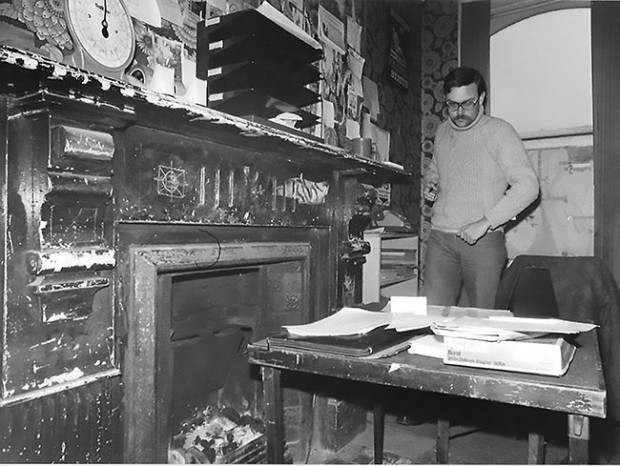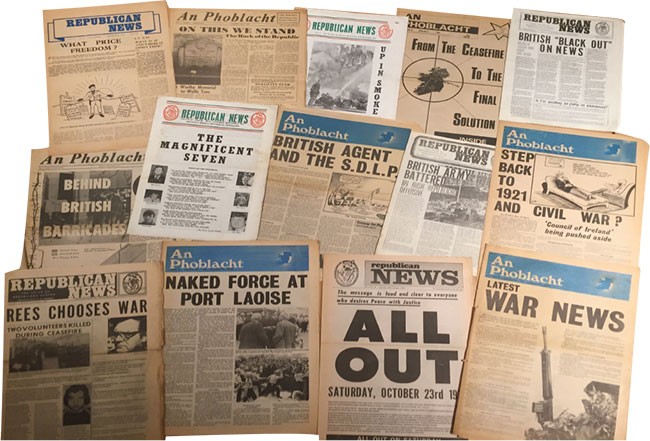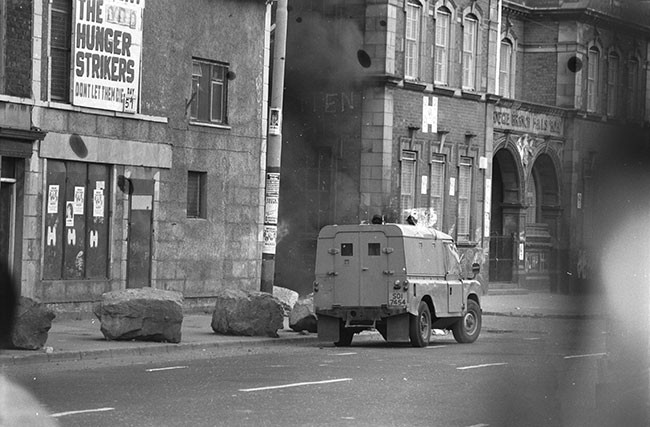27 November 2017 Edition
Getting out the republican message
Ex-Editor Danny Morrison looks back at An Phoblacht and Republican News

• Tom Hartley in the offices that housed ‘Republican News’ and the Republican Press Centre, late 1970s
1970 – The British Army was once again killing civilians and in the back streets the IRA was being reorganised and readied
WE NERVOUSLY sold the first edition of Republican News from underneath our jackets after Mass outside St Paul’s Chapel on the Falls Road in west Belfast.
The title had been published before, in the 1940s, but had gone out of print as that phase of the republican struggle had petered out. It was now 1970, the British Army was once again killing civilians and in the back streets the IRA was being reorganised and readied.
If I try to capture the atmosphere back then it is one of communal fear and insecurity; a deep sense of dread; searching for answers and explanations; looking to the South for help.
Nationalists were overwhelmingly peaceful – felt powerless, were intimidated by authority and had a mindset conditioned and pummelled by the supremacy of unassailable unionist rule. We were led by an obeisant Catholic Church, viewed the world largely through the prism of the conservative Irish News and were about to be politically led by Gerry Fitt, MP for West Belfast, and his new SDLP.
That said, there was a new awakening, particularly among the youth, manifested for us in the simple fact that we sold out every copy of the paper – and people wanted more!
The nationalist Establishment (for want of a better word) were forever deferential to the British Government, indebted for the least crumb. Republican News’s objective was to offer an alternative analysis which used history to explain our predicament and from which to draw lessons: we were not going to get our civil rights or our national rights without a struggle, and unionism and British rule was now reinforced by the physical presence of British arms.
The first editor back then was Jimmy Steele, who had been interned in 1923, aged just 16. Jimmy died suddenly in August 1970.

I wrote my first article for the paper in October 1972 after the death of my IRA comrade Paddy (Maguire) Pendleton. Paddy wasn’t given a republican funeral. I wrote about going into St Paul’s Chapel, when no one was around, and quietly paying my respects at his coffin.
A few weeks later I was arrested and interned in Long Kesh.
After my release, and during the 1975 ceasefire, I was asked by Billy McKee if I thought I could edit the paper. Being a brat I said, “Of course!” though I hadn’t a clue. I was 23 and with the help (and guidance) of the manager of the Republican Press Centre, Tom Hartley, we set out to develop the paper – progressive and challenging – with new writers and, of course, Brian Moore’s famous and hugely popular ‘Cormac’ cartoons.
Our office at 170a Falls Road was in a derelict and damp building above a doctor’s surgery. But it represented us putting a public face on republicanism and a place where the media could find a spokesman (yes, the women were spokesmen back then!). It was regularly raided by the British Army and the RUC. Loyalists tried to car-bomb it. Hand grenades were thrown at the windows and staff were shot at. Billy Kennedy, one of our delivery men, was wounded (as was a member of the production staff at An Phoblacht/Republican News at Parnell Square in 1981). Tom Hartley and I were lifted from 170a and brought to Castlereagh while old ‘Bingo’ Campbell (who was the office runner) lifted the refuse bin, put it to his shoulder and loudly saying, “Excuse me,” made his way past the soldiers on the stairs and away to freedom!
Bobby Sands, upon his release from Long Kesh, would come in looking for paper and Gestetner ink for a new community paper he was bringing out in Twinbrook and we would chat about how things were going and what we thought was happening.
British direct ruler Roy Mason particularly took umbrage at the paper and ordered its closure. Soldiers smashed their way into the office and threw the Telex machine out the first-floor window, not realising that it didn’t belong to us but was rented from the Post Office! Twenty homes were raided and charges were concocted against Republican News staff and the executive of Belfast Sinn Féin, including Danny Devenny (now a famous muralist) and Marie Moore (later Deputy Mayor of Belfast). Our archives were seized and to complete the intimidation and ensure that no business in the North would take our work they imprisoned the printer, Gary Kennedy, a member of the SDLP, and charged him with IRA membership. We eventually got bail and by February 1979 the case fell apart.
The largely Northern-based Republican News and An Phoblacht had been in healthy competition but we in the North had an advantage of getting many stories first and exclusively, so it made sense that a pooling of resources would result in a much more professional paper and so both were merged in 1979, I becoming its first editor.

• RUC armoured vehicles outside 51/53 Falls Road during the 1981 H-Blocks Hunger Strike
Against a background of official and unofficial censorship, and a largely compliant media, AP/RN (as it is still referred to by many ‘old hands’) singularly countered the black propaganda of the state and the demonisation of republicanism. We exposed torture in the jails and in the RUC interrogation centres. We interviewed IRA spokespersons. We opened up the paper to columnists critical of Sinn Féin to encourage discussion and debate around a range of social and economic issues. I remember once covering a story about cattle rustling in County Leitrim!
The toughest time, it probably doesn’t need said, was the seven long, heart-breaking months of the 1981 Hunger Strike when friends and comrades died defying the criminalisation of not just themselves but of Ireland’s centuries-old fight for freedom. And yet the staff at 44 Parnell Square and at our new office at 51/53 Falls Road (years before the advent of mobile phones, desk-top publishing and computerised layout) worked around the clock, reporting the old-fashioned way on every demonstration, protest, vigil, picket, press conference, election campaign – and then each death, each funeral.
As I was writing the obituary for Joe McDonnell, a few hours after he had died, we could hear the sound of plastic bullets being fired outside. ‘Bingo’ Campbell shouted up the stairs that the RUC had just shot a woman. I ran to Linden Street corner to see a woman lying unconscious, dying, her head twice its normal size. Nora McCabe was a childhood friend and neighbour of mine, a mother-of three, who had gone to the corner shop for cigarettes when the cops shot her for no reason.
In October 1982 I reluctantly had to give up the editorship when I was elected as a Sinn Féin Assembly Member for Mid Ulster, though I continued in an oversight role as Sinn Féin Director of Publicity until my arrest in 1990 where from prison I wrote a column for the paper.
There is an old biblical expression, “All Things Must Come To Pass” (which Bobby Sands paraphrased in his poem The Rhythm of Time-), and which means that nothing stands still, things change, evolve, and often for the better.
In former times, print editions of Irish republican newspapers ceased publication for a variety of reasons but usually associated with a downturn in the struggle, with exhaustion or a shortage of ideas.
These are modern times, with ever-improving methods of digital communication, in word, sound and vision, instantaneously worldwide, and unimaginable just 20-odd years ago. What we could have done and achieved had we those means back in those years of oppression!
In 1970, those teenagers sold republican newspapers from underneath their jackets, hiding from the Brits and the RUC. In 2017, the Irish republican message, particularly articulated by the young, is open, confident, mainstream, developing and progressing.
The ‘old new’ An Phoblacht still fits into your jacket!




